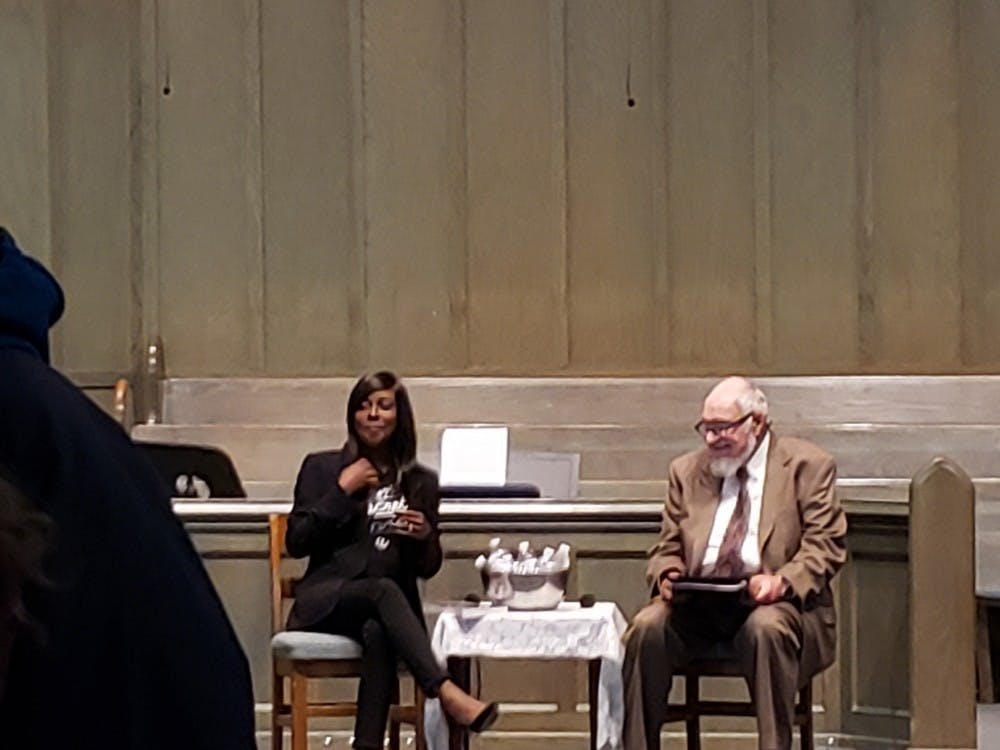Antero Pietila, a former Baltimore Sun reporter, discussed his new book, The Ghosts of Johns Hopkins at the Union Baptist Church on Wednesday. Catalina Byrd of WMAR-TV’s “Squared Off” moderated the talk.
Pietila’s new book addresses the lasting impact and legacy of the will and testament of University founder Johns Hopkins.
Pietila said that his objective in writing the book was to spark discussion around modern issues in the City.
“My book aims to explain Johns Hopkins and his legacy, the University and medical institutions, and their place in a mutating city. In covering over 200 years of local history, I wanted to provide readers with a framework for understanding Baltimore and how it became what it is today,” he said. “The aim of The Ghosts of Johns Hopkins is not to blame anybody. I want people to understand what’s going on, because there are pros and cons to every situation.”
Pietila explained that the money Hopkins left behind allowed both the University and the Hospital to be built. According to Pietila, Hopkins’ vision for the Hospital was notably progressive for his time.
“When he decided to donate his riches to create a hospital and a university, his main interest was the Hospital,” he said. “If you read his will, he talks about the hospital, how it should cater to indigents, regardless of sex, age or color.”
However, Pietila also discussed the differences between the goals of Johns Hopkins and legacy of the institutions that hold his name. He explained that despite Hopkins’ original vision, the Hospital was segregated by race.
“Johns Hopkins died before any of these institutions were opened,” he said. “It’s interesting because when the Hospital was opened, there was no strict segregation between the patients, but then white doctors and other medical professionals felt uneasy about the situation, so first a wall was built, then a separate ward.”
Pietila addressed some of the controversies surrounding the Hospital. In the 1800s, grave robbers commonly exhumed the bodies of people of color and sold them to the Hospital so that medical students could practice on the cadavers.
“Baltimore’s black population always provided clinical material for Hopkins, and one illustration is the grave robbery trade,” he said.
He also discussed the legacy of Henrietta Lacks, a black patient who was treated for cervical cancer at the Hospital in 1951, and whose cancer cells were harvested without her consent. These cells are now known as the HeLa cell line, the first cell line which can reproduce infinitely, and have been used in medical research and to treat polio. The discussion surrounding Lacks’ legacy raised questions of medical ethics and consent.
Pietila noted that even today, a distance exists between the University and the surrounding community.
“The city that we are is this — Johns Hopkins institutions are first-world islands in a city that increasingly exhibits third-world dysfunctions in its population, behavior and social statistics.”
Pietila also explained the Baltimore Plan, a 1950s residential plan to decrease gentrification and prevent urban blight by financing residents to improve their homes. He noted that the University refused to participate in the project despite its physical proximity to it.
However, he did acknowledge that today, the Universityhas increased its presence in the community.
“Hopkins now is involved in many things, and I think that they are doing a very serious effort. Whether it is enough is another question,” he said.
Martha Jews, a native Baltimorean who attended the talk, noted that the book underscored the importance of recognizing the past.
“There are some dastardly things done by Hopkins, and we need to make sure they never happen again,” she said.
Freddie McCall, a Hopkins alum, was surprised by Hopkins’ focus on the Hospital over the University.
“Probably the snippet that I thought was most interesting was that Hopkins left so little to say in his will about the University,” he said.
He noted that Pietila’s talk was more factual and informative than critical.
“He’s definitely taking more of a neutral, journalistic stance towards his approach. He’s kind of displaying all of these facts so that people have an understanding of Baltimore history,” he said.
Baltimorean Lenora Hammett was particularly interested in Pietila’s discussion of Henrietta Lacks. Hammett related this to the idea that, to this day, the University continues to negatively impact some minority communities.
“Many Baltimoreans have different views of Hopkins. A lack of concern for the minority community in terms of health is something that Hopkins has been known for,” she said.





